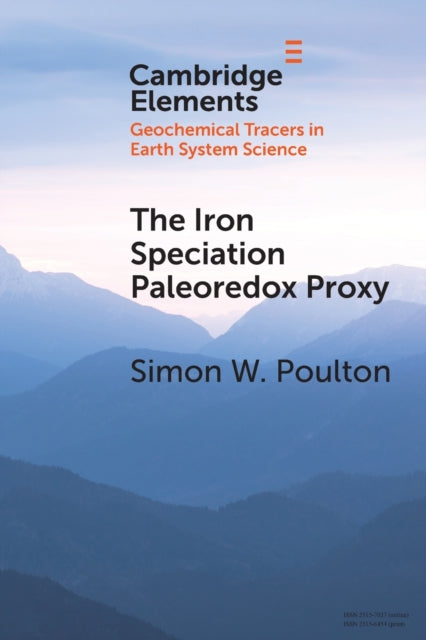Simon W.Poulton
Iron Speciation Paleoredox Proxy
Iron Speciation Paleoredox Proxy
YOU SAVE £0.86
- Condition: Brand new
- UK Delivery times: Usually arrives within 2 - 3 working days
- UK Shipping: Fee starts at £2.39. Subject to product weight & dimension
Bulk ordering. Want 15 or more copies? Get a personalised quote and bigger discounts. Learn more about bulk orders.
Couldn't load pickup availability
- More about Iron Speciation Paleoredox Proxy
Iron speciation has been a valuable paleoredox proxy, allowing for the distinction of three major oceanic redox states. The latest scheme incorporates advanced considerations and case studies to provide insights into ancient ocean redox conditions.
Format: Paperback / softback
Length: 75 pages
Publication date: 04 March 2021
Publisher: Cambridge University Press
Iron speciation has been a valuable paleoredox proxy for centuries, with significant advancements in technique over time. The latest scheme, unique in its ability to distinguish three major oceanic redox states - oxygenated, ferruginous, and euxinic - offers a powerful tool for understanding past ocean conditions. This Element explores the theory behind the proxy, the methods employed, and potential challenges in interpreting Fe speciation data. Additionally, a series of case studies showcases how advanced analysis, often in conjunction with other techniques, can provide unprecedented insights into the redox state of ancient oceans.
The concept of iron speciation as a paleoredox proxy has a rich history, dating back to the early days of scientific exploration. Iron is a versatile element that can exist in different oxidation states, and its distribution in natural environments can provide insights into past redox conditions. Over the years, scientists have developed various methods to analyze iron speciation in samples, including wet chemistry techniques, such as acid digestion and spectrophotometry, and instrumental techniques, such as ICP-MS and XRF.
One of the most recent advances in iron speciation is the development of the three-state scheme, which distinguishes between oxygenated, ferruginous, and euxinic oceanic redox states. This scheme is based on the distribution of iron species in different oceanic environments and has been refined over the years to improve its accuracy and reliability. The three-state scheme has the potential to provide valuable insights into the history of ocean redox conditions, as well as the processes that control the distribution of iron in the ocean.
One of the key advantages of the three-state scheme is its ability to distinguish between different redox states that are difficult to detect using traditional methods. For example, oxygenated oceanic conditions are characterized by high levels of dissolved oxygen, while ferruginous conditions are characterized by high levels of iron sulfides and other reducing compounds. Euxinic conditions, on the other hand, are characterized by low levels of dissolved oxygen and high levels of hydrogen sulfide.
The three-state scheme has been applied to a wide range of oceanic samples, including sediments, seawater, and biogenic materials. These studies have provided valuable insights into the redox history of ancient oceans, as well as the processes that control the distribution of iron in the ocean. For example, studies have shown that the distribution of iron species in ancient oceans can be used to infer changes in atmospheric carbon dioxide levels, which can in turn provide insights into climate change over time.
However, interpreting iron speciation data can be challenging, and there are several potential complications that need to be considered. One of the most significant challenges is the presence of other elements that can interfere with the analysis of iron speciation. For example, calcium and magnesium can compete with iron for binding sites in sediments, which can result in errors in the interpretation of iron speciation data. Additionally, the presence of organic matter can also interfere with the analysis of iron speciation, as it can bind to iron and prevent it from being analyzed.
To overcome these challenges, scientists have developed a range of techniques to improve the accuracy and reliability of iron speciation data. These techniques include the use of multiple analytical methods, such as ICP-MS and XRF, to ensure that iron is analyzed in a consistent and reproducible manner. Additionally, the use of reference materials and standardization protocols can help to improve the accuracy and reliability of iron speciation data.
In conclusion, iron speciation has been a valuable paleoredox proxy for centuries, and the three-state scheme has been a significant advancement in our understanding of past ocean conditions. The scheme has the potential to provide valuable insights into the history of ocean redox conditions, as well as the processes that control the distribution of iron in the ocean. However, interpreting iron speciation data can be challenging, and there are several potential complications that need to be considered. By using advanced techniques and careful analysis, scientists can overcome these challenges and gain a deeper understanding of the redox state of ancient oceans.
Weight: 68g
Dimension: 151 x 229 x 7 (mm)
ISBN-13: 9781108810685
This item can be found in:
UK and International shipping information
UK and International shipping information
UK Delivery and returns information:
- Delivery within 2 - 3 days when ordering in the UK.
- Shipping fee for UK customers from £2.39. Fully tracked shipping service available.
- Returns policy: Return within 30 days of receipt for full refund.
International deliveries:
Shulph Ink now ships to Australia, Belgium, Canada, France, Germany, Ireland, Italy, India, Luxembourg Saudi Arabia, Singapore, Spain, Netherlands, New Zealand, United Arab Emirates, United States of America.
- Delivery times: within 5 - 10 days for international orders.
- Shipping fee: charges vary for overseas orders. Only tracked services are available for most international orders. Some countries have untracked shipping options.
- Customs charges: If ordering to addresses outside the United Kingdom, you may or may not incur additional customs and duties fees during local delivery.


